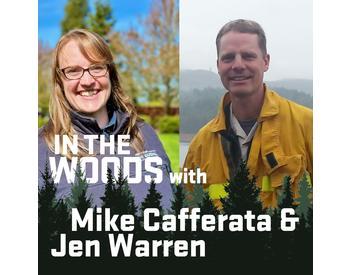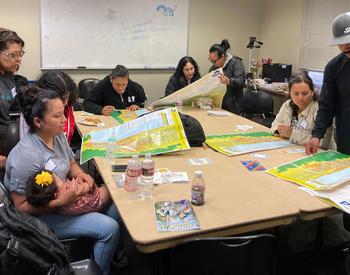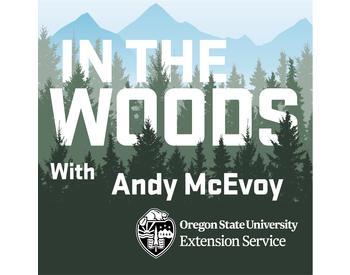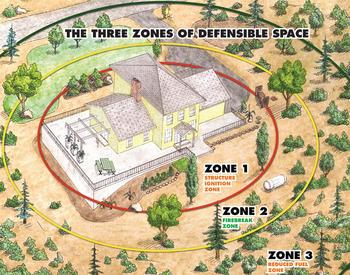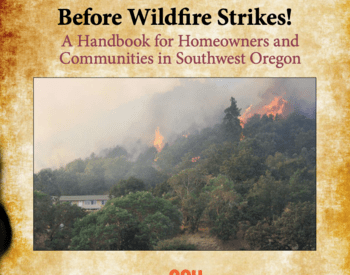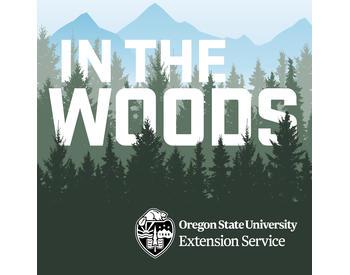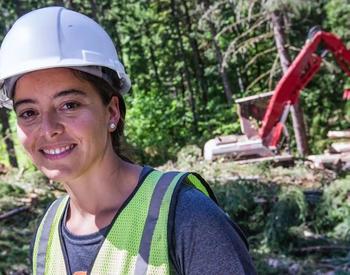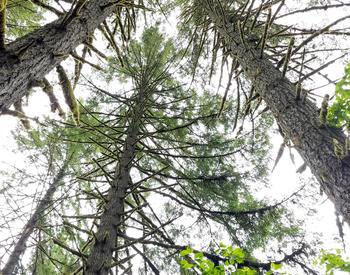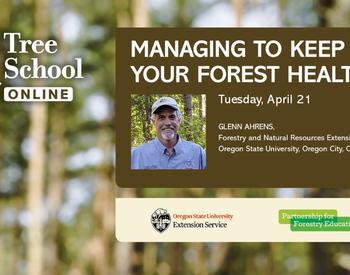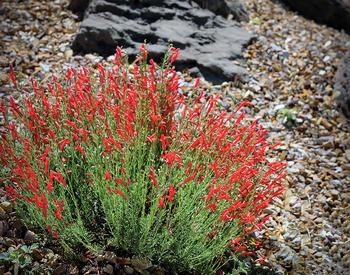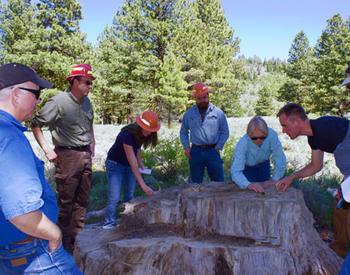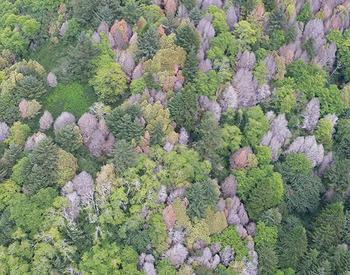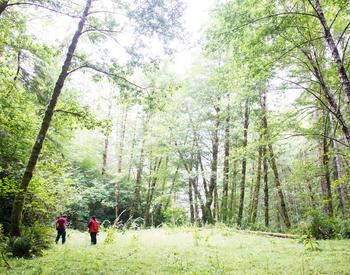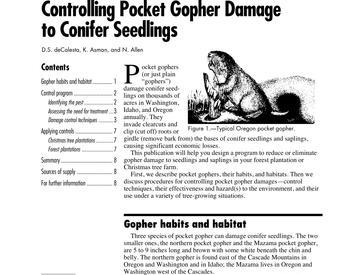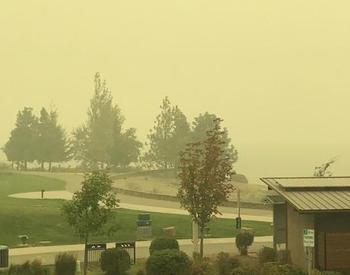Transcript
From the Oregon State University's extension service, you are listening to In the Woods with the forestry and natural resources program. This podcast aims to show the voices of researchers, land managers, and members of the public interested in telling the story of how Woodlands provide more than just trees. They provides interconnectedness that is essential to your daily life. Stick around to discover a new topic related to forests on each episode.
Welcome back to another episode of In the Woods. I'm your host Lauren Grand, assistant professor of practice and extension agent in Oregon State University's college of forestry. May is wildfire awareness month.
And if you haven't noticed we're all about Firetalk on the podcast this month. If you missed our last episode, we met OSU extension forestry's fire team. I learned all about the great projects they're working on around the state, like prescribed fire trainings, youth programs, and collaboration between agencies to make sure all Oregonians are fire prepared
Today, EJ and Carrie are back on the podcast to help me learn more about fire adapted communities. Welcome back ladies. I'm so glad you can both join me on the podcast today. We have a great conversation planned. EJ is going to be helping us understand what fire adapted communities are and what land owners need to know to get started.
Carrie is going to share her experience with leading her community to become a fire adapted community and what they do to stay prepared. EJ, before we dive in, do you want to tell us a little bit more about yourself again? Sure Lauren! Um, yeah, it didn't come to this work from the fire world. I grew up in rural New Hampshire where I guess we did have a lot of trees, but not so many fires.
Uh, I somehow got interested in fire after moving out west for school and then really interested in it after moving to Oregon. And, uh, now I'm a social scientist who studies collaboration and partnerships, how we can work together and reduce fire risk and apply that work through my work with the fire program. Well, it sounds like you're perfect for this role of fire adapted communities and how people can work together, uh, to learn more about fire and be prepared.
Carrie, Carrie, welcome back. Tell us about how you're doing and where you're from and about yourself. Yeah. Hey Lauren. Good to be back. Um, so I mean, I'm sure your listeners, uh, from listening to the last podcast know that I'm the fire program manager. And I worked closely with EJ on, you know, the programs, uh, strategic goals and initiatives, but like EJ, um, well I come from the Midwest and I, I didn't have a lot of wildfire in my, uh, experiences back there. And so coming to the west is just been really eyeopening. And, um, it's been about 15 years now that I've, that I've been living in Oregon. And because we're talking about fire adapted communities, I'll say that I've been living in my skyline west neighborhood for about eight of those years.
Great. And I'm so it was so fun to hear that as you learned and worked with fire more, that you totally adapted it to your own life and space, and I'm so excited for you to help you share your story. It's a good one. Well, thank you for giving me the platform to, to share my story. I'm I'm quite excited. Uh, our group has worked really hard, and that's what it's about, right? Adapted. We adapted to what fits our neighborhood and our lifestyle. So, thanks for having me on.
Yeah, well, let's learn more about what that means. Um, EJ can you get us started simple? What's what is a fire adapted community?
We'll try to keep it simple, but there's actually a lot involved in being a fire adapted community.
So, it begins from the concept that like right fire doesn't know any boundaries. So, that means we're all facing, we're all facing fire risk. Like you, your neighbors, your community, everyone in that larger landscape around your community. You all can contribute to the risk of fires and you can also take actions that might reduce that risk, not just for yourself, but for everyone.
Right? So for example, my neighbor, might've gone ahead and send some vegetation on their place to reduce fuels, but I, if I haven't, I'm increasing the risk for everyone around me. Um, so with that background, I would say that being a fire adapted community is about being aware of those risks of fire that your community faces.
And then being prepared to address them. But the most important ingredient is it's not just about individuals being prepared. It's about everyone being prepared to work together, to take action as individuals and as a community. And that's across all phases of fire. So, before a fire happens, during a fire, and after it, and then that means that there are a lot of different pieces involved.
It includes protecting public health from smoke. It includes things like being prepared for evacuation. Um, it means navigating different policies and programs to bring funding, to do the work, and all that kind of thing. So, it really is not just clearing brush around your house. It's a lot more than that. I'll also add, like Carrie said what it means to be fired, adapted and what that's going to look like is going to be different in every community.
So, there isn't a single checklist. There isn't a single prescription. Um, generally the more actions you take, the more fire adapted you can become. And I think Carrie's story of her specific community will help you understand what that can look like in that particular place.
Well, you're right. That does sound like a lot of moving parts, but Carrie, how did you go about bringing this important topic to your neighbors?
Well, Lauren, I'll be honest and say that bringing information related to wildfire and fire adapted communities, especially here on the west side of the cascades, where I'm at in Corvallis definitely didn't happen overnight. There's a lot that goes into being fired, adapted, uh, like EJ said, and I really feel it starts with a conversation.
Uh, it's as simple as talking to your neighbors. So, that's what we did a group of us that were part of the neighborhood safety committee. We went door to door to get neighbors, to sign up for a neighborhood list serve. And while I appreciate the exercise of walking around to 168 homes, we thought an email list serve would make it a little easier to communicate with everyone.
In addition to getting emails, we then provided some initial information on wildfire in Oregon. And, Lauren, I don't know how many people at that time took me seriously about wildfire, again that was eight years ago, but they definitely do now.
Yeah, when I work with landowners, I'm also on the west side and, you know, a few years ago, even, it was much harder to bring up fire as something that was really something we needed to focus on and prepare for, because it just doesn't happen here that often.
But, unfortunately, we've had the experience come through, um, which has brought more attention to people to be prepared.
That's right.
So, you know, a lot of people I'm sure have heard of the program, Fire Wise or Firewise USA, it's pretty popular program. And, you know, I'm even guilty of using it a lot in regular language.
Like, um, like everybody should know what it means. Um, and we use it in a lot of our education programs in extension, um, EJ, what, what's the difference between a fire adapted communities and Firewise? Is uh, fire adapted communities just a fancy way of saying fire wise? No, that's a good, that's a good question.
Um, so, Firewise USA, like you said, that's actually a trademark program and it's led by the National Fire Protection Association in partnership with state level liaison. So, for us here in Oregon, that state level liaison is the Oregon Department of Forestry. The difference is that Firewise again, is a specific trademark program.
And it's focused on mitigation actions that residents can take right around their homes. And so becoming a Firewise site involves getting at that designation by taking some required steps. You have to do a community risk assessment, you have to update it and then you have to undertake and then report out a minimum amount of mitigation work annually and your computer in your community to maintain that designation.
So, but in contrast to the specific designation, Firewise USA, fire adapted communities, it's just much more of a broad framework. And again, like I said before, it's focused on the larger scope of aspects of being fire adapted. It includes but goes beyond just resident mitigation actions. So, a handy way to think about it is that Firewise is one tool that could be used to help undertake actions to be fired adapted, but it's just one tool. Does that makes sense?
Yeah, definitely. It brings it into focus a little bit and helps maybe get people their toe in the water when thinking about how they can work with their community to become fire prepared. Just to start, you know, it's talking about fire wise and building with their community and then taking that next step to fire adapted communities and, you know, working with more partners and continuing the learning process.
Is that right?
Yeah, that's right. And I think that as you go through steps, Carrie, we'll talk about this. If you go through steps to figure out what you want your fire adapted community look like, and you reach for the right tools that are going to help you do it your way, and Firewise can be one of those tools.
Okay. That, that clears things up. So, Carrie, what are some of the ways that your fire adapted community takes actions to keep your community fire resilient? Yeah. So, um, first I want to start by saying, I think EJ already said this, that there is no real recipe to becoming a fire adapted community. And, um, actually that's the beauty of it, right? You can be creative and throw in whatever actions work for your area. And again, there's no end to it. It's not like you get a checklist. Uh, and once you check all the boxes, you are then fire adapted community. It's really a continual process with no end point. So, while there's not an exact recipe to follow, there are some things you can do based on where your neighborhood is at in terms of its relationship to wildfires.
So, for me, when I moved into my neighborhood eight years ago, none of us really fully understood our risks. So, that's what we started with. We asked the local fire chief and the city forester to come out to our neighborhood to assess each home for its vulnerability to fire embers. And then once we had that risk assessment, we then created a neighborhood fire plan that then fed into that, um, Firewise USA program that EGA talked about and we applied for recognition as a Firewise community. So, by following the Firewise techniques, my neighbors individually can do their part to reduce their vulnerability to wildfire and collectively make our neighborhood and the neighborhoods that surround us that much safer. So, for years, we've been using these like Firewise techniques, and I'm doing air quotes there, such as tree trimming, cleaning up gutters and roofs, uh, removing flammable materials around our home structures
like woodpiles, my husband loves to have the woodpile up against the house. So, in the winter, when it's pouring rain, he doesn't have to walk through the rain to get wood, but come spring, we are, we move those woodpiles away from our home structure. And then also just, you know, being more mindful of the materials we're using on our homes like decking and fencing and things like that.
And other ways we've taken action, uh, over the years is renting debris dumpsters and having dumpster days and well, dumpster days might sound a little funny. Uh, it's really a time that our community comes together. We work together to reduce the amount of fuel by di disposing it in these organic debris dumpsters.
And, you know, these community days, Lauren have opened other opportunities for us to engage with groups like the master gardeners. Uh, they've come in and helped us and talk to us about selecting more fire resistant type vegetation for landscaping. The Corvallis fire department has come out with both their structural and wildland firefighting engines.
And of course the kids like absolutely love that. It's such a learning experience. But then most recently in 2019, um, we had gotten to a point where a lot of the people living in the neighborhood were putting in the work around their homes and landscapes to, to mitigate that risk without even being really prompted anymore to do so.
So, we've leveled up and with the city and the emergency management services for both the city and the county, we planned an evacuation exercise. Um, skyline west. Uh, my neighborhood was one of the first neighborhoods to go through this exercise and we all learned so much, um, including the emergency management services, they also learned a lot. Um, this year, Lauren, we're looking to evacuate over 10 neighborhoods in Benton county. So, I mean, we're really doing a lot. And so from where we started to where we are now is just truly incredible. And I'm hopeful that my neighbors. Uh, not only feels safer, but also feel a sense of connection with each other and to the community, to all that we've done. And I know I definitely do.
Yeah, I was gonna, say dumpster days, is that sounds great. It's like the block party for people who live in the woods. It must be a great way to get neighbors, to get to know each other a little bit better and have fun together because... Absolutely... We don't do that enough anymore. So, you mentioned a few organizations that you've collaborated with to do some of this work, um, fire departments and emergency, and to do some of the emergency evacuation practice, you know, who should be a part or for other work for other neighborhoods who are thinking about how to get started, who should be the collaborators with the community who should be a part of your Firewise community?
Yeah. Well, you just mentioned it. And like I said, we've worked with the city of Corvallis, the fire department, police department, and emergency services, uh, for again, both the city and county to create that evacuation exercise. But I've also worked with city planners and they've asked me to come to their scheduled events to share my neighborhood experience.
We've uh, our neighborhood is actually bordered on all sides by forest owned by different people. So, I've worked with Oregon State University's college of agriculture, um, and they have been super responsive to fuel reduction on their properties. I've also worked with different neighborhoods and other Firewise communities.
And, you know, actually the list really goes on and I think that everyone should be part of a fire adapted community, whether you are a homeowner, a renter, a business owner, uh, and definitely community leaders, it really takes everyone.
Yeah, it's that it takes a village saying really plays a good.
So, um, that's really great. How does your fire adapted community continue to learn about fire resiliency? Well, I'm constantly looking for new learning opportunities for us and because of COVID these last two years, I've been really relying on webinars and providing learning opportunities through those webinars.
Uh, the extension fire program, actually this time last year, put out many different webinars on how to be fire aware and fire prepared and increase your fire resiliencies. So, that's just one way. We've continued learning together during these challenging times.
How fun that you get to bring that home and share not only what you do for work with your community, but it also helps build your community and help your neighbors out.
I love it. I'm so fortunate.
Yeah, that's great. Um, okay, EJ, so tell me a little bit more about how communities can learn more about starting this process.
There's a lot of places you could go. There's a ton of resources out there. There's the fire adapted communities network, or we call it FAC net. It has a really comprehensive website, tons of information, some of it's visual, like graphics that show all those pieces of the fire adapted community like I was talking about. They have a facilitator's guide, something I like that they have too is they have a blog with specific stories from different fire, adopted community members and practitioners. And a lot of these resources are available in Spanish language as well, which is cool. I'd also just really recommend peer learning.
So, talk to others, learn from them. Maybe it's a community near, nearby, yours that you know, that people have been doing some things. And it's also good to hear from people like Carrie who've been through organizing their community, like all those specific examples she was able to explain about how they went about it.
People like Carrie, have those practical lessons learned. I think the one thing I would say is no matter what you got to remember, that it isn't a recipe. Like she said, I'm going to go on a limb for a minute. I was thinking about this cookbook that I have in my approach to cooking. I have this cookbook called the Flavor Bible and it doesn't have recipes.
It just has like different ingredients and things to know about them and ideas. And this is my favorite cookbook 'cause I don't like to cook with recipes, but my partner really hates that. And if there's no recipe and then he's like, doesn't know what to do. And so I just say that as a word of like moral support, there's actually plenty of recipes out there now from people who have done this and this is how it worked in their community, but sometimes you need to approach it a little more open-ended and say, I'm going to make my own recipe based on what I know of these ingredients.
So, that ends your, a cookbook ad for the podcast.
I was going to say you're so brave. I think I'm a little bit more like your partner and nervous in the kitchen. I need a recipe.
Oh my goodness, me too.
No, you got to just go for it sometimes.
Well, we need to make a list of called people like Carrie. And so we're no matter where you are, where you can find the person that can make the recipe and you can consult with them.
So, that for every person like me who needs help creating a recipe or likes recipes. They can pair up with a person like Carrie and together they can make a fire adapted community work for them. .
I don't know if it really worked, but I tried. So, Carrie, um, any additional tips that, um, you want to share from your personal experience? Well, Hmm. I, so I moved into my neighborhood, like I said, eight years ago, knowing very little about wildfire. Uh I'm from the Midwest and wasn't exposed to the threat of wildfire growing up as much as we are here out west.
So, when my husband and I bought our house, all we saw was a neighborhood lush with vegetation. It was silly and surrounded by more vegetation. We didn't see that there was only one way in and one way out of our neighborhood or that there were no fire hydrants, but look at how far I've come with my neighborhood.
So, my tip to your listeners is even if you think you don't have what it takes to do all this fire stuff, know that you do. You can be the spark that motivates your community. There are so many great resources available to support this work. Like, you know, we talked about already Firewise USA, uh, Oregon State Extension, Oregon State Fire Marshal's office, uh, Oregon Department of Forestry, even like Oregon Health Authority has great information on their websites regarding, uh, health and smoke from wildfires.
A lot of these resources are like EJ was saying available in both English and Spanish and other languages too, actually. So, I also know though that the fire hose of information can be overwhelming and daunting. So, I recommend, oh, shoot Lauren. What what's that saying about the elephant? Do you know what I'm talking about, eating an elephant one bite at a time. Just eat away at the fire problem one bite at a time and know that you can do it. And, you know, just, just start somewhere, just start simple, do something.
Yeah, that's great advice. I always have the same advice when people are writing management plans, it seems really overwhelming. And they're like, just start writing, just, just, you know, give yourself the confidence to just say I'm just going to start here and, um, you can accomplish anything.
So, EJ, can you tell me a little bit more about what you think the future holds for Firewise fire adapted? See, I didn't look at that. It's easy to mix them up. For fire adapted communities in Oregon? Yeah. So we, I'm glad you asked that. I mean, the last few years we know that the number of people affected by fires has been increasing and so we're going to have to all be more and more aware of fire adapted of what it takes to be fire adapted community. And as Carrie points out, even places on the west side are places where you never thought you'd see a fire. I think that's what we have to do. Um, but there are some kind of policy changes on the horizon that landowners and forest managers should be aware of.
So, in 2021, the legislature here in Oregon passed a bi-partisan bill, Senate bill 7 62 focused on advancing wildfire protection in the state. And it is a total game changer because it invests a large amount of money, $195 million, but it also is asking 11 different state agencies to take this unprecedented action.
Like we're going to work together on coordinated actions so that we better understand wildfire risk, then we're better able to implement activities to reduce that risk. It also focuses on how we respond to fires, fire suppression, and then just ultimately how we live with fire as best as possible. And within all of that, some specific things that you can expect to hear about later this year include, um, and there's going to be a statewide map of wildfire risks, that's gonna provide risk classifications for different lands around the state. They'll also then coming from that, be some new guidelines and regulation about defensible space, building codes and land use that will eventually be implemented as, as that comes out of the assessment of risk. So, my recommendation is to stay aware of these, uh, changes that might affect you by following news from agencies like the Oregon State fire marshal's office to learn what they're doing, but really it's also important to know that there are going to be new and increased grant and other funding opportunities to get mitigation work done for many landowners. There's gonna be more opportunity to perform some of that Firewise work to be a fire adapted community.
There's also going to be more air quality monitoring, more access to smoke filtration systems and more clean air shelters. So, hopefully more and more resources that you as individuals can use coming down the line. And, um, when I think about this, the Senate bill 7 62, it kind of goes back to what I said at the beginning of our podcast.
Like we're all in this together. We all share some of this risk. That means we all have to work together to manage it. It takes many hands to work on the many pieces of being fired, adapted. I was just thinking, you can almost think of this new Senate bill as a fire adapted community approach for the whole state of Oregon.
If that makes sense.
Wow. That sounds great. I love the way that that really brings it. Ties a bow on everything. Um, and that we, it creates an opportunity for us all to work together. Um, it's a great way to think about it. Okay. So, now that we're all, we all have this, uh, call to action to work together. Um, let's finish with something that, you know, each of us can go home and do.
So, Carrie what's one thing, or a couple of things, that you can suggest to our listeners for what the next step is to advance fire adapted communities? Sure, I would recommend that, um, if your listeners are just starting out, meaning if this is the first time they're thinking about wildfire, becoming a fire adapted community, simply talk to your neighbors, talk to your local community leaders about your wildfire concerns.
You could also talk with your local fire department about like a community risk assessment. Or maybe your neighborhood is actually further along and has done fuel reduction projects already. So, why not consider something like an evacuation exercise or, or dumpster days, whatever it is just take a step toward, uh, doing something.
Something is definitely better than nothing, right? Each take one of the we can each share a giant elephant. How about that? Okay. I took it too far. Sorry. Well, that's all the questions I have for you today. I'm so glad you were able to join me back on the podcast. I always have so much fun, um, with you Carrie and EJ.
It's good to know that. Even though fire is a big topic and it can be really daunting for some people. There's ways that neighbors can come together and learn more to make their communities a more fire resilient place to live. So, um, hopefully people will be able to hear this podcast and have new ideas and feel a sense of calm going into, you know, things that they can do to help out their community, and all of Oregon.
So, if you're listening today and you had any other questions come up or we didn't cover a specific topic related to fire that you were interested in, drop us a comment or send us a message on our website, @inthewoodspodcast.org. Okay, don't leave us yet, our lightning round is up next.
All right, well, we have our last few final questions that we ask all of our guests. And since Carrie and EJ have been on the podcast before, I'm going to make things a little bit harder for them and ask them to share what alternative favorites are, so they can't use their same question, their same answers from before.
All right, I'm going to call on Carrie first. Carrie, what's your favorite tree or shrub that you haven't shared with us already?
Um, so last time I shared the Larch, my ultimate, but I do love the Ponderosa pine. It's the smell, the color, like just all of it. It's so good. I love that tree. Um, yeah. So I'll go with the tree.
EJ same question. I'm going to mix it up and go a shrub. Living out here in the Oregon white Oaks. I really like mock orange and I really like ceanothus. The mock orange smells so nice and the ceanothus looks so pretty. Yeah, those are nice. I just learned about mock orange recently since I haven't had the chance, well, I hadn't learned about it until I moved to Oregon, so something that Oregon, um, shared with me when I, when I came here. So.
Yeah, that's a good one.
All right, and what is the most interesting thing that you bring with you into the field? Whether it's in your cruiser vest, field kit, or just something you like to keep in your back pocket.
EJ, you want to go first this time? Sure. I, I mean, it's not that interesting, but food, I mean, and a lot of food, different kinds of food, always bringing a lot of snacks.
I was always taught in extension was we create community and you can't have community without food. So, I think that's a great tool. Carrie?
Um, well, I agree, EJ like I also pack a lot of food. Um, it'd be interesting to hear what your favorite food is too pack. Um, so for me, in addition to food, um, so I have the worst sense of direction.
I can't believe they actually allow me to go out in the woods. So, I bring a whistle for safety sake. Hopefully, you know, if I were to get lost, someone would hear me blow the whistle. I was bringing a whistle.
That's great. That's a great thing to bring anyway. Now, I want to know too, EJ. What's your favorite food?
Well, I really liked to bring like nuts from Trader Joe's. You know, some of those different flavored nuts. Those are always good. People usually appreciate if you have chocolate and you can hand it out at a crucial moment when tempers might be flaring or people are getting tired. Beef jerky. Yeah, the list really goes on and on.
I need to go to more meetings with EJ, what do you think?
Oh yeah, she's got the good stuff.
Okay, ladies. Lastly, what resources would you recommend to our listeners if they're interested in learning more about fire adapted communities?
Yeah, so I would recommend, um, there's, uh, actually a fire adapted communities website, and that's at fireadapted.org and then there's the Firewise USA a website and you can find that by going to, um, NFPA.org, and then of course there's OSU extension and our new fire program. We also have a website with tons of resources. Uh, those webinars I mentioned earlier, the fireware fire prepared are all available on our website and that's at extension.oregonstate.edu/fire-program.
And Carrie named some great resources.
I would just add, you know, some of our state agencies have a lot of resources too. So, as I mentioned, Oregon State Fire Marshal's Office, the Oregon Department of Forestry, those are also great places to check.
Great. That's a great place to start, I think. And we'll have all those resources linked to our webpage.
So, it's easy to find for everybody that's at inthewoodspodcast.org. I'm so glad that I was able to have you two back on the podcast today. Thank you so much for taking the time. That concludes our episode of In the Woods. Thanks so much for listening. Join us in a couple of weeks for another episode, until then, what's in your woods?
Thank you so much for listening. Show notes with links mentioned on each episode are available on our website inthewoodspodcast.com. We would love to hear from you, visit the tell us what you think tab on our website to leave us a comment, suggest just a guest or topic, or ask a question that can be featured in a future episode. And, also, give us your feedback by filling out our survey.
In the Woods was created by Lauren Grand, Jacob Putney, Carrie Berger, Jason O'Brien and Stephen Fitzgerald, who are all members of the Oregon State University Forestry and Natural Resources Extension team. Episodes are edited and produced by Kellan Soriano. Music for In the Woods was composed by Jeffrey Hino and graphic design was created by Christina Friehauf.
We hope you enjoyed the episode and we can't wait to talk to you again next month, until then what's in your woods?
In this episode, Lauren Grand is joined by Carrie Berger & Emily Jane Davis to discuss how communities can be better prepared for wildfires.
